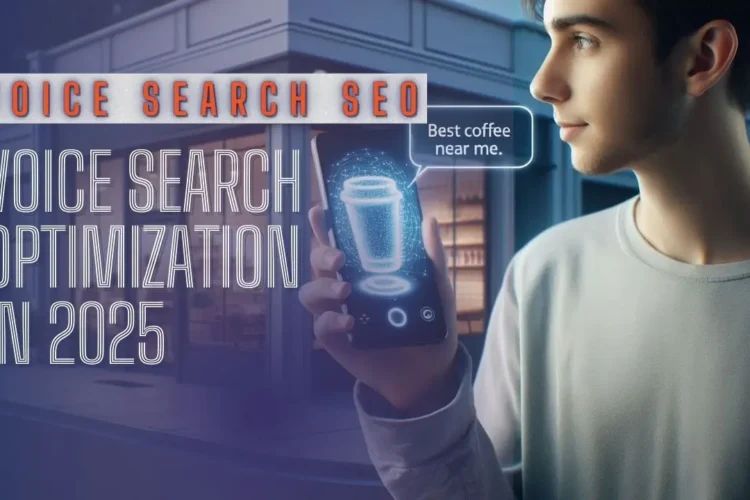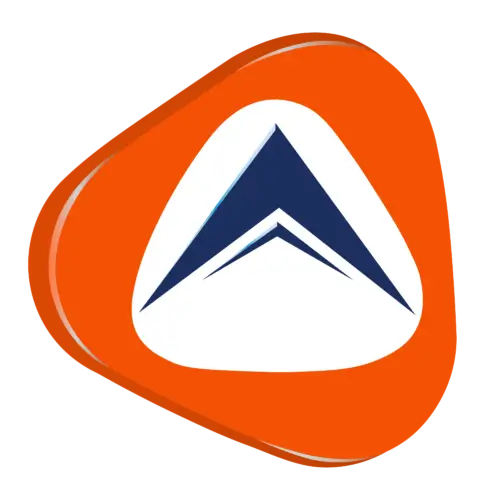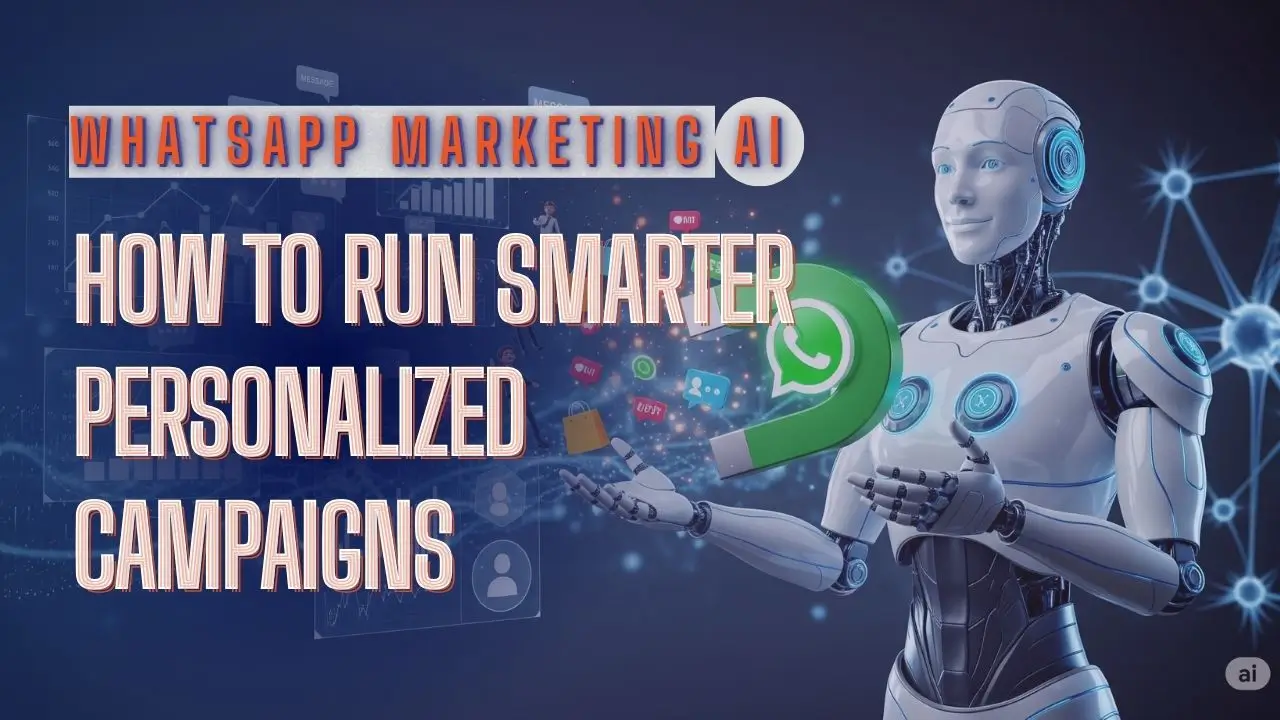

Imagine if every WhatsApp message your brand sent felt like it was written for one single customer—addressing their needs, preferences, and timing perfectly. That’s the power of WhatsApp marketing AI.
This blog explores how AI-powered personalization is transforming WhatsApp marketing, enabling businesses to create targeted campaigns, automate customer conversations, and drive higher engagement. You’ll learn what AI-personalized WhatsApp campaigns are, how to implement them, best practices, case studies, and future trends.
Table of Contents
- What is WhatsApp Marketing AI?
- Why AI-Personalized WhatsApp Campaigns Matter in 2025
- Key Benefits of AI in WhatsApp Business API Marketing
- WhatsApp Marketing Powered With AI for Small Business
- How to Create AI-Personalized WhatsApp Campaigns
- Best Practices for WhatsApp Marketing AI
- Common Mistakes to Avoid
- Real Examples & Case Studies
- Future Trends in AI-Powered WhatsApp Marketing
- FAQs
- Conclusion
What is WhatsApp Marketing AI?
WhatsApp marketing AI is the use of artificial intelligence to automate, personalize, and optimize marketing campaigns on WhatsApp.
It combines customer data, behavior analysis, and natural language processing (NLP) to send hyper-relevant messages. Unlike generic WhatsApp broadcasts, AI-personalized campaigns ensure each customer feels like they are having a one-on-one conversation with your brand.
👉 Example: Instead of sending “Happy Diwali! Enjoy 20% off,” AI can send “Hi Rahul, since you bought festive lights last year, here’s 20% off on our new eco-friendly lamps this Diwali.”
Why AI-Personalized WhatsApp Campaigns Matter in 2025
By 2025, WhatsApp is expected to have over 3 billion users worldwide (Statista). Businesses that rely only on generic campaigns will lose relevance.
AI-personalized WhatsApp campaigns matter because:
- Customers demand real-time engagement.
- 72% of consumers expect brands to recognize them as individuals (Salesforce report).
- Personalized WhatsApp messages see 4x higher conversion rates than standard blasts.
Multimedia idea: Infographic showing “Generic vs. AI-Personalized WhatsApp Campaign Conversions.”
Key Benefits of AI in WhatsApp Business API Marketing
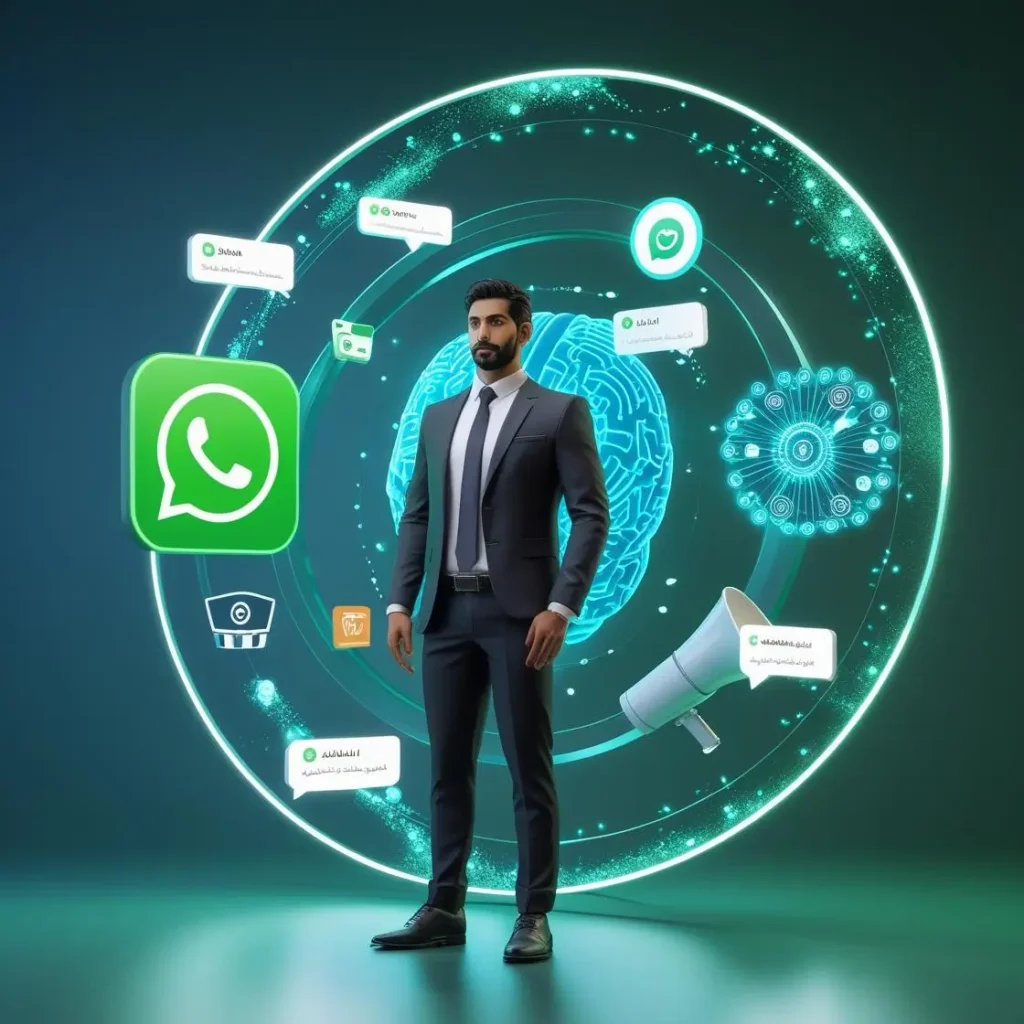
Using the WhatsApp Business API with AI allows businesses to scale communication while keeping it personal.
1. Hyper-Personalized Customer Journeys
AI analyzes purchase history, browsing behavior, and demographics to deliver tailored messages.
2. Automated 24/7 Conversations
AI chatbots handle FAQs, orders, and support queries without human intervention.
3. Smarter Customer Segmentation
AI clusters customers into micro-segments for targeted campaigns (e.g., “frequent buyers of skincare products”).
4. Data-Driven Decision Making
AI-driven analytics provide insights into message performance, open rates, and customer sentiment.
| Traditional WhatsApp Marketing | WhatsApp Marketing AI |
| One-size-fits-all messages | Personalized per user |
| Manual responses | Automated AI chatbots |
| Limited insights | AI-powered analytics |
WhatsApp Marketing Powered With AI for Small Business
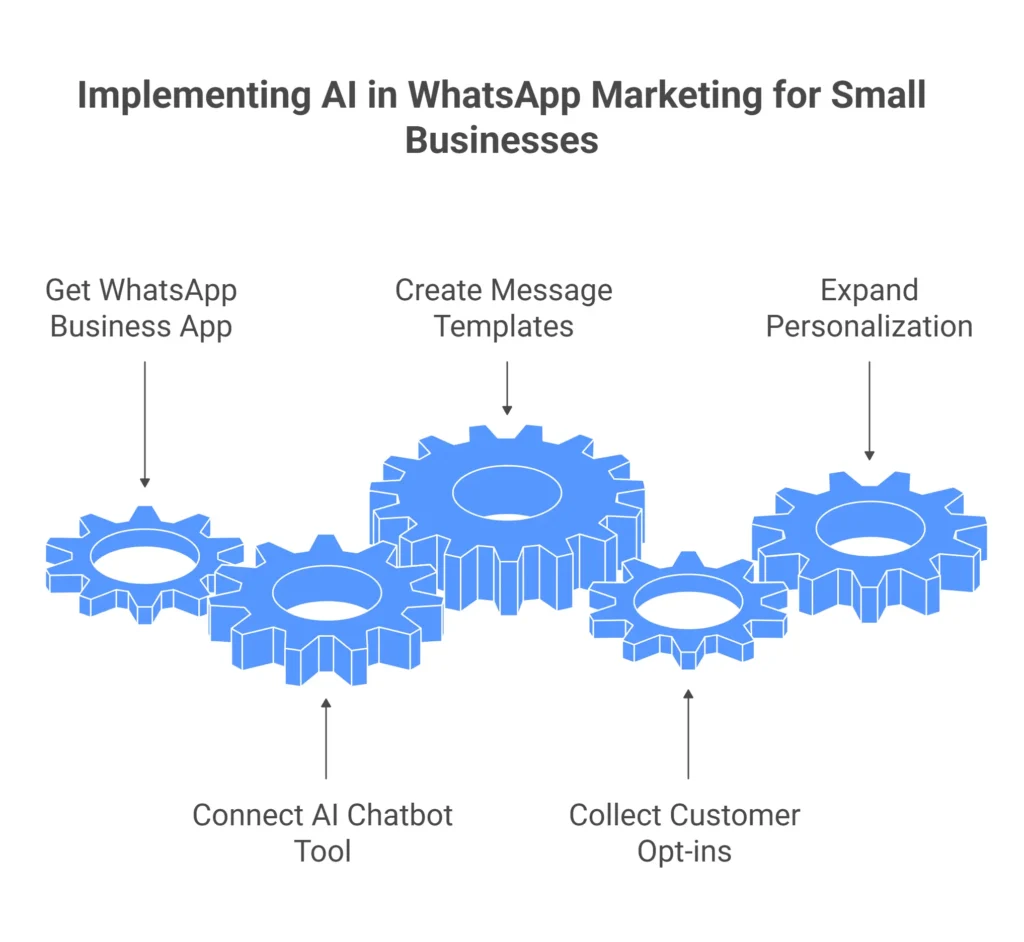
Many small businesses think AI is only for large enterprises with big budgets. But the reality is, AI WhatsApp marketing for small businesses is not only affordable—it’s one of the smartest ways to compete.
Here’s how small businesses can make the most of it:
1. Start Simple with Automated Replies
- Use AI chatbots to answer FAQs like “What are your store timings?” or “Do you deliver in my area?”
- Saves time for owners and creates quick responses for customers.
👉 Example: A local bakery can set up an AI bot to share today’s menu, special offers, and take orders directly on WhatsApp.
2. Use Personalized Promotions
- AI can suggest offers based on previous purchases.
- Send festival or birthday discounts to repeat buyers.
- 👉 Example: A salon can remind customers when it’s been 6 weeks since their last haircut and offer a loyalty discount.
3. Automate Appointment & Booking Reminders
- Perfect for doctors, dentists, tutors, gyms, or beauty parlors.
- AI ensures no appointments are forgotten by sending friendly reminders.
4. Collect Feedback Effortlessly
- Use AI to ask customers short surveys after service.
- Example: “How was your meal today? Rate us from 1–5.”
Feedback helps small businesses improve quickly.
5. Affordable Marketing at Scale
- Instead of spending heavily on SMS or email campaigns, small businesses can run AI-personalized WhatsApp campaigns that are cheaper and more effective.
Quick Steps for Small Businesses:
- Get WhatsApp Business App or API.
- Connect it with a simple AI chatbot tool.
- Start with 2–3 message templates (offers, FAQs, reminders).
- Collect customer opt-ins.
- Expand gradually into advanced personalization.
How to Create AI-Personalized WhatsApp Campaigns
Creating AI-driven WhatsApp campaigns requires planning, technology, and strategy. Here’s a detailed guide with important points, scenarios, and industry-specific notes:
Step 1: Set up the WhatsApp Business API
- Register your business and get verified by Meta.
- Choose a Business Solution Provider (BSP) like Twilio, Gupshup, or MessageBird.
- Ensure compliance with WhatsApp opt-in rules.
📌 Remember: Without API access, advanced AI personalization isn’t possible.
Step 2: Integrate AI & CRM Tools
- Connect AI platforms with CRM (HubSpot, Salesforce, Zoho).
- Use NLP-based chatbots for conversations.
- Enable predictive analytics to anticipate customer needs.
👉 Example: An airline CRM integrated with AI can send flight reminders, check-in links, and weather updates via WhatsApp.
Step 3: Collect & Organize Customer Data
AI relies on data for personalization. Collect:
- Purchase history
- Browsing patterns
- Location and language
- Customer preferences
📌 Important point: Data must be opt-in and GDPR compliant.
Step 4: Define Clear Campaign Objectives
Ask:
- Do we want to increase sales?
- Do we want to reduce cart abandonment?
- Do we want to improve support response times?
👉 Different goals = different AI models.
Step 5: Design Personalized Message Flows
AI should adapt to customer responses. For example:
- If a user clicks “Yes” on a discount, AI shares checkout links.
- If a user replies “Not interested,” AI offers an alternative product or exits politely.
📌 Scenario Example – Retail:
- Customer abandoned a cart. AI sends:
- Day 1: “Hey Anjali, you left the blue handbag in your cart. Want to complete your order?”
- Day 2: “We’ve saved your cart! Here’s 10% off to help you decide.”
Step 6: Time Campaigns Smartly
AI determines the best send times based on user activity.
- Morning for healthcare reminders.
- Evening for e-commerce deals.
- Weekend mornings for travel promotions.
📌 Industry Specific:
- Banking: Loan reminders before due dates.
- Hospitality: Hotel check-in messages 24 hrs before arrival.
Step 7: Personalize Across Languages & Cultures
- Use AI translation for multilingual markets.
- Adjust campaigns for local festivals/events.
👉 Example: A brand in UAE can send Eid Mubarak offers in Arabic, while targeting Indian expats with Diwali greetings in Hindi.
Step 8: Monitor, Test & Optimize
- A/B test AI-driven vs. generic campaigns.
- Track KPIs: CTR, conversions, opt-outs.
- Use AI analytics to refine tone, timing, and content.
📌 Special Instruction: Always start small (pilot campaign), measure results, and scale gradually.
Quick Checklist – Points to Remember
✅ Always get customer opt-in.
✅ Train AI on your brand’s tone.
✅ Avoid spamming – keep frequency balanced.
✅ Customize messages per industry.
✅ Blend automation with human fallback.
Best Practices for WhatsApp Marketing AI
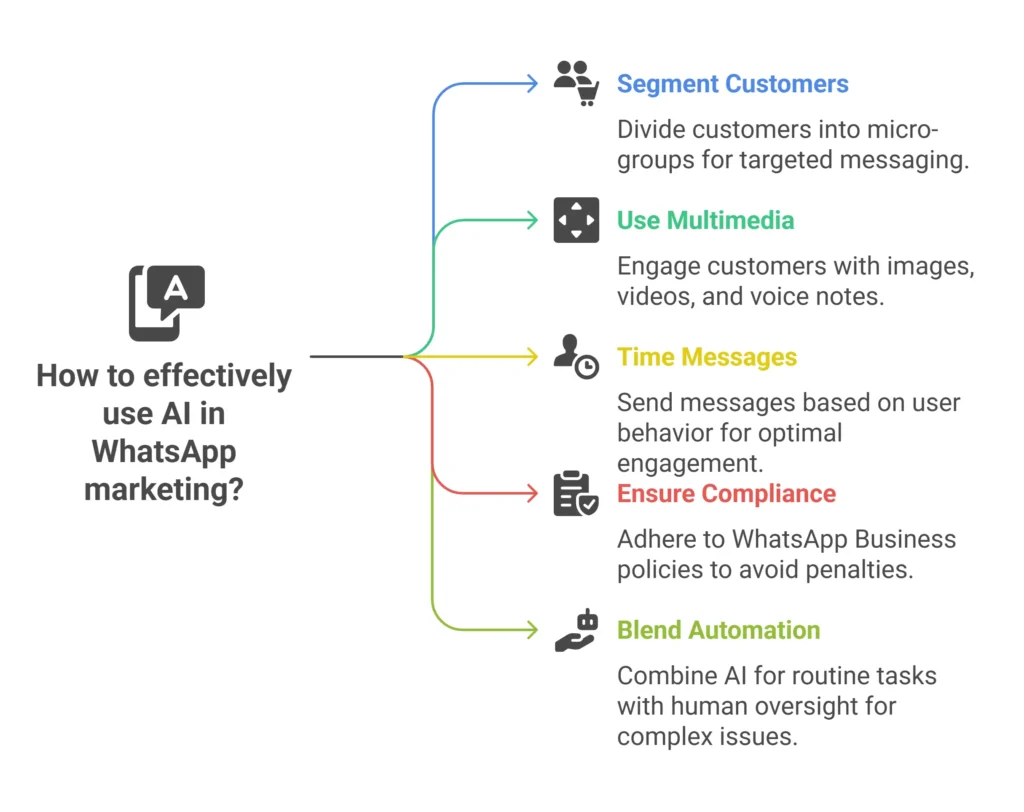
- Segment customers into micro-groups.
- Use multimedia (images, videos, voice notes) for engaging communication.
- Time messages based on user behavior.
- Ensure compliance with WhatsApp Business policies.
- Blend automation with human touch – AI handles routine, humans handle complex issues.
📌 Checklist example:
- Do I have customer consent?
- Are messages relevant and not spammy?
- Is AI trained on real customer data?
Common Mistakes to Avoid
- Over-automation: Customers still value human interaction.
- Ignoring cultural context: AI must adapt to local festivals, languages, and habits.
- Sending too many messages: Leads to customer opt-outs.
- Not tracking ROI: Without analytics, personalization is guesswork.
Real Examples & Case Studies
E-commerce Brand in India: Used AI-powered WhatsApp campaigns to remind customers about abandoned carts. Result: 30% recovery rate in sales.
Healthcare Startup in UAE: Integrated WhatsApp AI chatbot for appointment reminders and follow-ups. Result: 40% reduction in no-shows.
Banking Sector: AI-personalized loan reminders and EMI notifications improved customer trust and repayment rates.
Future Trends in AI-Powered WhatsApp Marketing
- AI Voice Integration – Sending personalized audio notes.
- Predictive Campaigns – AI predicting when customers are most likely to buy.
- Multilingual AI Messaging – Automated translation for global campaigns.
- Deeper CRM Integration – WhatsApp AI working seamlessly with Salesforce, HubSpot, and Zoho.
By 2030, AI-driven personalization will be the standard, not the exception in WhatsApp marketing.
FAQs
What is WhatsApp marketing AI?
WhatsApp marketing AI is the use of artificial intelligence to automate and personalize marketing campaigns on WhatsApp for better customer engagement.
How are AI-personalized WhatsApp campaigns different from bulk messaging?
Bulk messaging is generic, while AI-personalized WhatsApp campaigns use customer data to send tailored, one-to-one style communication.
Can small businesses use WhatsApp Business API marketing with AI?
Yes, as long as businesses follow WhatsApp’s opt-in rules and avoid spamming. AI only enhances personalization—it doesn’t bypass compliance.
What industries benefit most from WhatsApp marketing AI?
E-commerce, banking, healthcare, education, and travel industries benefit most due to their high need for real-time, personalized communication.
Does WhatsApp marketing AI require coding skills?
Not necessarily. Many AI-powered WhatsApp platforms provide no-code integrations with drag-and-drop builders.
Conclusion
AI-personalized WhatsApp campaigns are revolutionizing how businesses engage with customers. By leveraging WhatsApp marketing AI through the WhatsApp Business API, brands can create personalized, scalable, and high-performing campaigns.
If you’re ready to move beyond generic messaging and embrace AI-driven personalization, our team can help you design, set up, and optimize your campaigns.
Contact us today to supercharge your
WhatsApp marketing strategy with AI.



